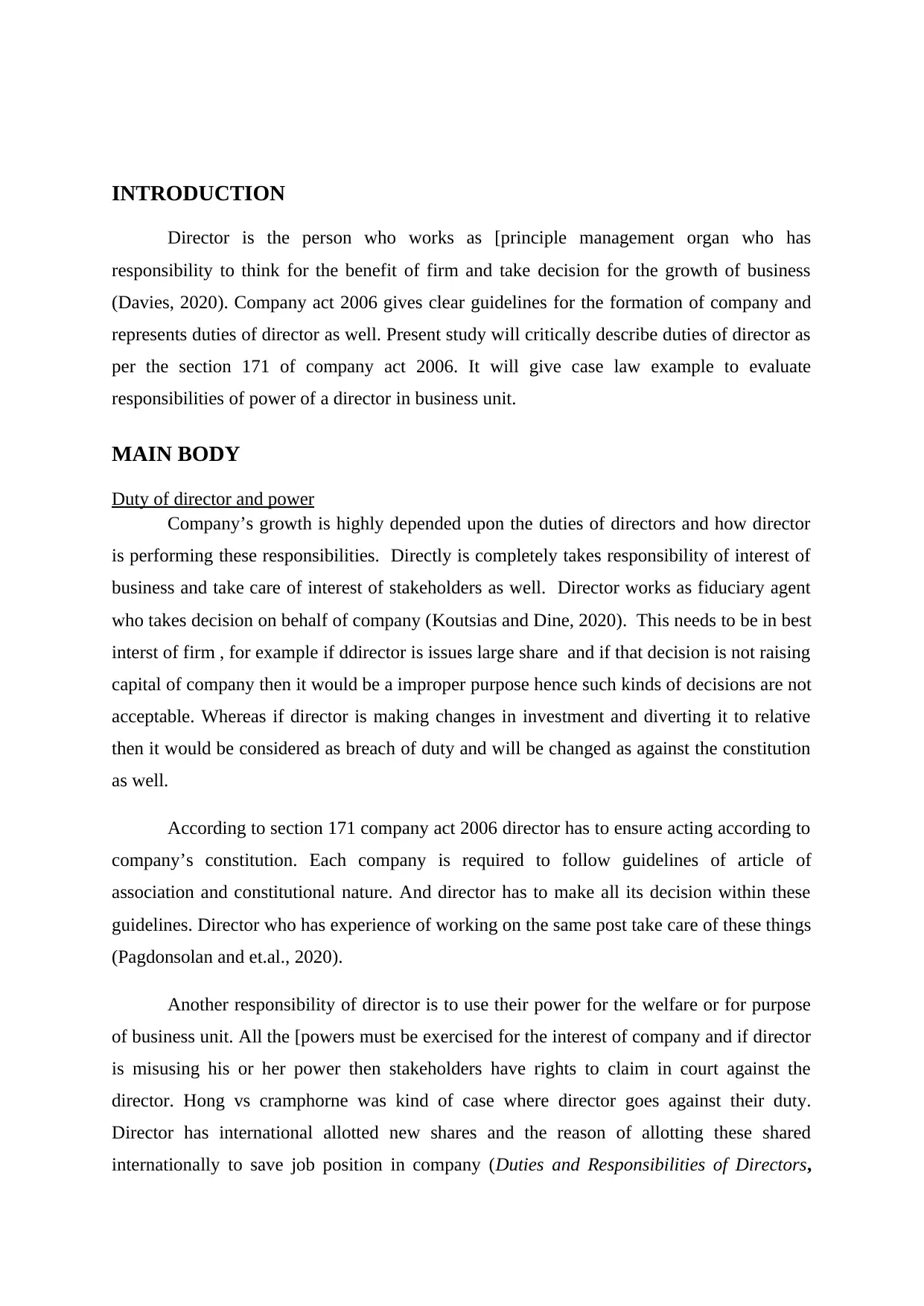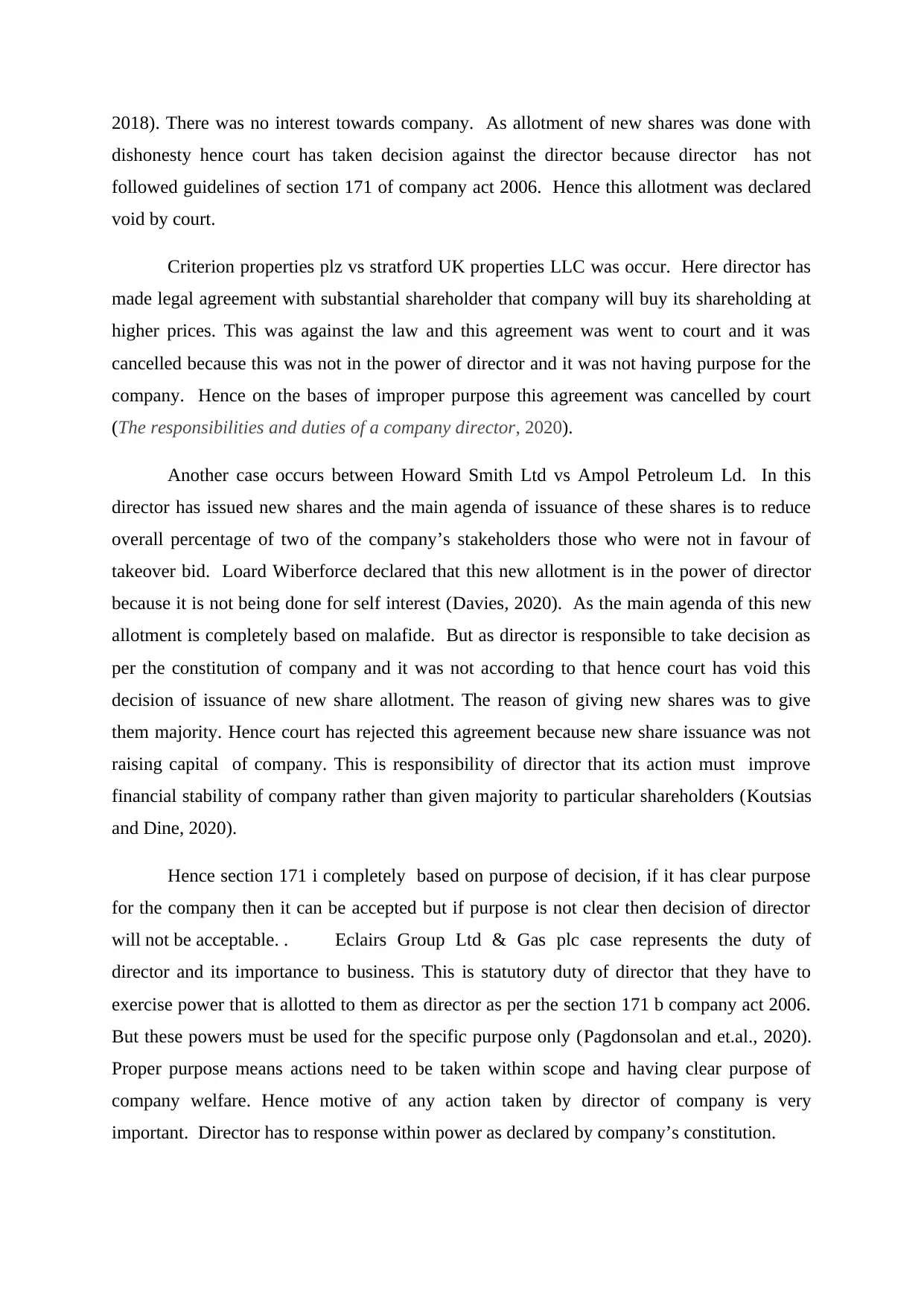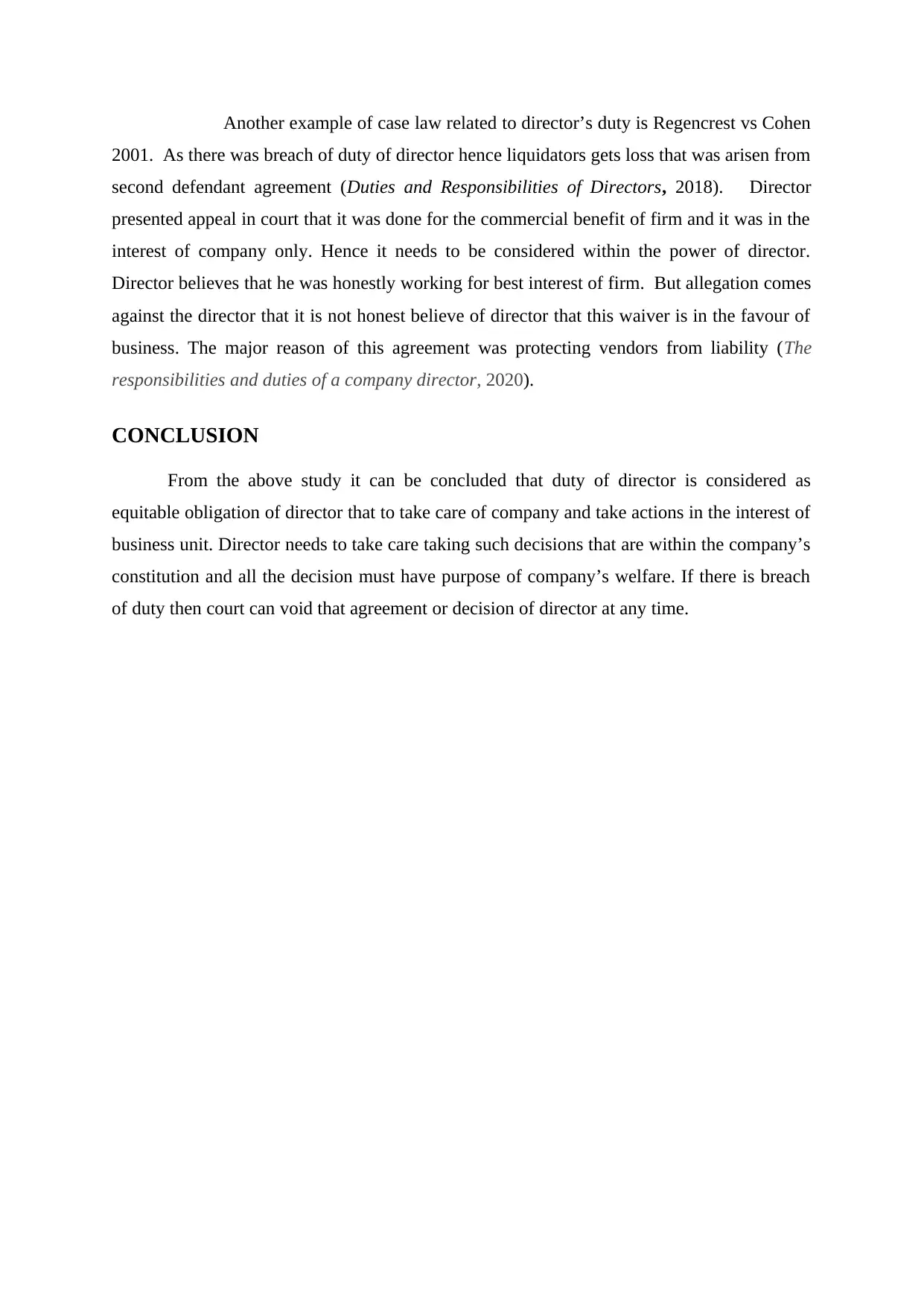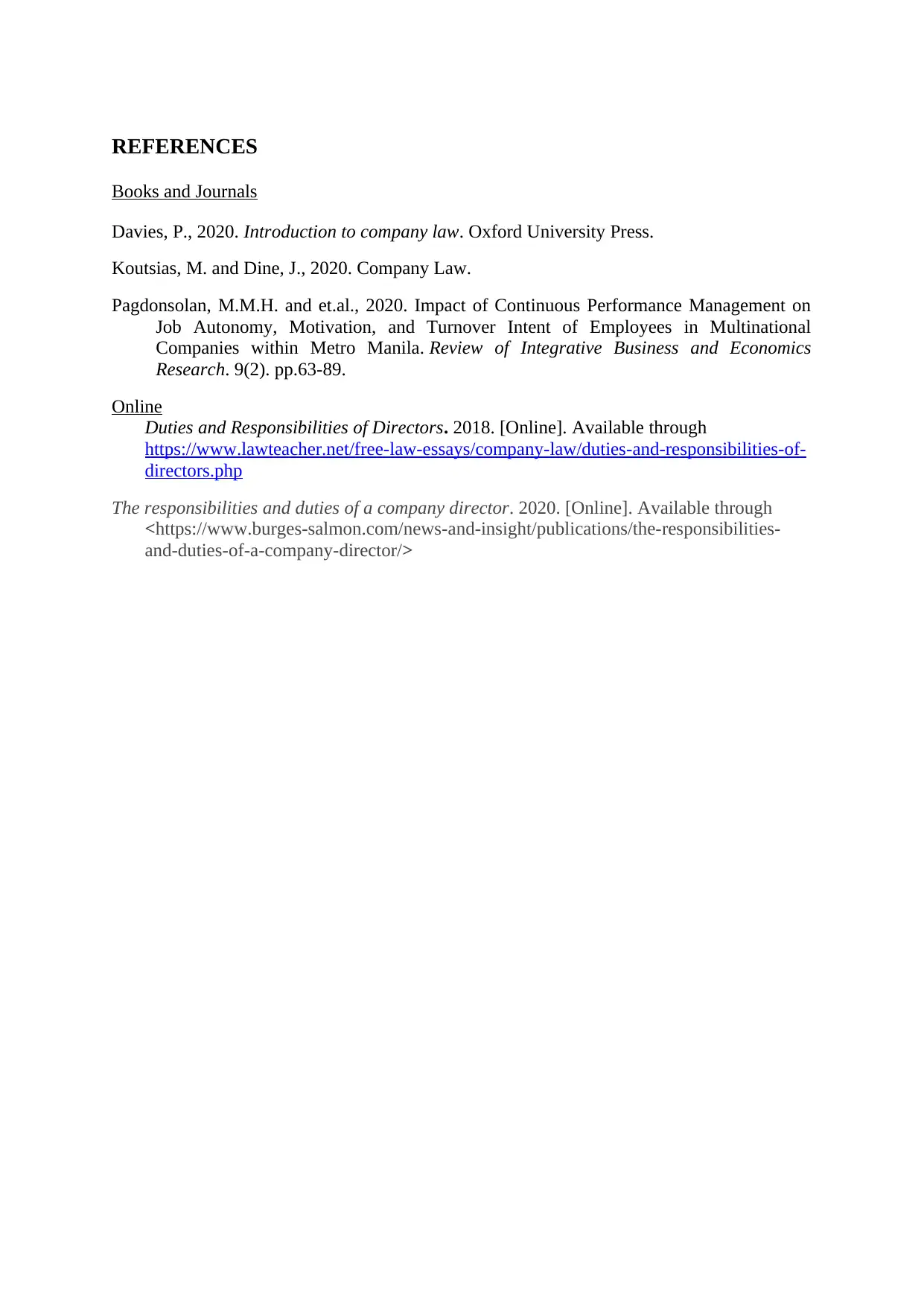MOD003379: Director's Duties and Powers in Company Law
VerifiedAdded on 2023/01/12
|6
|1246
|48
Report
AI Summary
This report critically analyzes the duties and powers of a company director under the Companies Act 2006, focusing on Section 171. It explores the director's responsibility to act in the best interest of the company and its stakeholders, emphasizing the importance of adhering to the company's constitution. The report provides case law examples, including Hong vs Cramphorne, Criterion Properties plc vs Stratford UK Properties LLC, and Howard Smith Ltd vs Ampol Petroleum Ld, to illustrate the consequences of directors misusing their powers or acting against the company's welfare. It also discusses cases like Eclairs Group Ltd & Gas plc and Regencrest vs Cohen 2001, further highlighting the director's statutory duties and the importance of acting within the scope of their authority for the company's benefit. The report concludes that directors have an equitable obligation to prioritize the company's interests and make decisions in alignment with its constitution to avoid legal repercussions.

LAB PRESENTATION
REPLACEMENT
REPLACEMENT
Paraphrase This Document
Need a fresh take? Get an instant paraphrase of this document with our AI Paraphraser

Contents
INTRODUCTION......................................................................................................................3
MAIN BODY.............................................................................................................................3
Duty of director and power....................................................................................................3
CONCLUSION..........................................................................................................................5
REFERENCES...........................................................................................................................6
INTRODUCTION......................................................................................................................3
MAIN BODY.............................................................................................................................3
Duty of director and power....................................................................................................3
CONCLUSION..........................................................................................................................5
REFERENCES...........................................................................................................................6

INTRODUCTION
Director is the person who works as [principle management organ who has
responsibility to think for the benefit of firm and take decision for the growth of business
(Davies, 2020). Company act 2006 gives clear guidelines for the formation of company and
represents duties of director as well. Present study will critically describe duties of director as
per the section 171 of company act 2006. It will give case law example to evaluate
responsibilities of power of a director in business unit.
MAIN BODY
Duty of director and power
Company’s growth is highly depended upon the duties of directors and how director
is performing these responsibilities. Directly is completely takes responsibility of interest of
business and take care of interest of stakeholders as well. Director works as fiduciary agent
who takes decision on behalf of company (Koutsias and Dine, 2020). This needs to be in best
interst of firm , for example if ddirector is issues large share and if that decision is not raising
capital of company then it would be a improper purpose hence such kinds of decisions are not
acceptable. Whereas if director is making changes in investment and diverting it to relative
then it would be considered as breach of duty and will be changed as against the constitution
as well.
According to section 171 company act 2006 director has to ensure acting according to
company’s constitution. Each company is required to follow guidelines of article of
association and constitutional nature. And director has to make all its decision within these
guidelines. Director who has experience of working on the same post take care of these things
(Pagdonsolan and et.al., 2020).
Another responsibility of director is to use their power for the welfare or for purpose
of business unit. All the [powers must be exercised for the interest of company and if director
is misusing his or her power then stakeholders have rights to claim in court against the
director. Hong vs cramphorne was kind of case where director goes against their duty.
Director has international allotted new shares and the reason of allotting these shared
internationally to save job position in company (Duties and Responsibilities of Directors,
Director is the person who works as [principle management organ who has
responsibility to think for the benefit of firm and take decision for the growth of business
(Davies, 2020). Company act 2006 gives clear guidelines for the formation of company and
represents duties of director as well. Present study will critically describe duties of director as
per the section 171 of company act 2006. It will give case law example to evaluate
responsibilities of power of a director in business unit.
MAIN BODY
Duty of director and power
Company’s growth is highly depended upon the duties of directors and how director
is performing these responsibilities. Directly is completely takes responsibility of interest of
business and take care of interest of stakeholders as well. Director works as fiduciary agent
who takes decision on behalf of company (Koutsias and Dine, 2020). This needs to be in best
interst of firm , for example if ddirector is issues large share and if that decision is not raising
capital of company then it would be a improper purpose hence such kinds of decisions are not
acceptable. Whereas if director is making changes in investment and diverting it to relative
then it would be considered as breach of duty and will be changed as against the constitution
as well.
According to section 171 company act 2006 director has to ensure acting according to
company’s constitution. Each company is required to follow guidelines of article of
association and constitutional nature. And director has to make all its decision within these
guidelines. Director who has experience of working on the same post take care of these things
(Pagdonsolan and et.al., 2020).
Another responsibility of director is to use their power for the welfare or for purpose
of business unit. All the [powers must be exercised for the interest of company and if director
is misusing his or her power then stakeholders have rights to claim in court against the
director. Hong vs cramphorne was kind of case where director goes against their duty.
Director has international allotted new shares and the reason of allotting these shared
internationally to save job position in company (Duties and Responsibilities of Directors,
⊘ This is a preview!⊘
Do you want full access?
Subscribe today to unlock all pages.

Trusted by 1+ million students worldwide

2018). There was no interest towards company. As allotment of new shares was done with
dishonesty hence court has taken decision against the director because director has not
followed guidelines of section 171 of company act 2006. Hence this allotment was declared
void by court.
Criterion properties plz vs stratford UK properties LLC was occur. Here director has
made legal agreement with substantial shareholder that company will buy its shareholding at
higher prices. This was against the law and this agreement was went to court and it was
cancelled because this was not in the power of director and it was not having purpose for the
company. Hence on the bases of improper purpose this agreement was cancelled by court
(The responsibilities and duties of a company director, 2020).
Another case occurs between Howard Smith Ltd vs Ampol Petroleum Ld. In this
director has issued new shares and the main agenda of issuance of these shares is to reduce
overall percentage of two of the company’s stakeholders those who were not in favour of
takeover bid. Loard Wiberforce declared that this new allotment is in the power of director
because it is not being done for self interest (Davies, 2020). As the main agenda of this new
allotment is completely based on malafide. But as director is responsible to take decision as
per the constitution of company and it was not according to that hence court has void this
decision of issuance of new share allotment. The reason of giving new shares was to give
them majority. Hence court has rejected this agreement because new share issuance was not
raising capital of company. This is responsibility of director that its action must improve
financial stability of company rather than given majority to particular shareholders (Koutsias
and Dine, 2020).
Hence section 171 i completely based on purpose of decision, if it has clear purpose
for the company then it can be accepted but if purpose is not clear then decision of director
will not be acceptable. . Eclairs Group Ltd & Gas plc case represents the duty of
director and its importance to business. This is statutory duty of director that they have to
exercise power that is allotted to them as director as per the section 171 b company act 2006.
But these powers must be used for the specific purpose only (Pagdonsolan and et.al., 2020).
Proper purpose means actions need to be taken within scope and having clear purpose of
company welfare. Hence motive of any action taken by director of company is very
important. Director has to response within power as declared by company’s constitution.
dishonesty hence court has taken decision against the director because director has not
followed guidelines of section 171 of company act 2006. Hence this allotment was declared
void by court.
Criterion properties plz vs stratford UK properties LLC was occur. Here director has
made legal agreement with substantial shareholder that company will buy its shareholding at
higher prices. This was against the law and this agreement was went to court and it was
cancelled because this was not in the power of director and it was not having purpose for the
company. Hence on the bases of improper purpose this agreement was cancelled by court
(The responsibilities and duties of a company director, 2020).
Another case occurs between Howard Smith Ltd vs Ampol Petroleum Ld. In this
director has issued new shares and the main agenda of issuance of these shares is to reduce
overall percentage of two of the company’s stakeholders those who were not in favour of
takeover bid. Loard Wiberforce declared that this new allotment is in the power of director
because it is not being done for self interest (Davies, 2020). As the main agenda of this new
allotment is completely based on malafide. But as director is responsible to take decision as
per the constitution of company and it was not according to that hence court has void this
decision of issuance of new share allotment. The reason of giving new shares was to give
them majority. Hence court has rejected this agreement because new share issuance was not
raising capital of company. This is responsibility of director that its action must improve
financial stability of company rather than given majority to particular shareholders (Koutsias
and Dine, 2020).
Hence section 171 i completely based on purpose of decision, if it has clear purpose
for the company then it can be accepted but if purpose is not clear then decision of director
will not be acceptable. . Eclairs Group Ltd & Gas plc case represents the duty of
director and its importance to business. This is statutory duty of director that they have to
exercise power that is allotted to them as director as per the section 171 b company act 2006.
But these powers must be used for the specific purpose only (Pagdonsolan and et.al., 2020).
Proper purpose means actions need to be taken within scope and having clear purpose of
company welfare. Hence motive of any action taken by director of company is very
important. Director has to response within power as declared by company’s constitution.
Paraphrase This Document
Need a fresh take? Get an instant paraphrase of this document with our AI Paraphraser

Another example of case law related to director’s duty is Regencrest vs Cohen
2001. As there was breach of duty of director hence liquidators gets loss that was arisen from
second defendant agreement (Duties and Responsibilities of Directors, 2018). Director
presented appeal in court that it was done for the commercial benefit of firm and it was in the
interest of company only. Hence it needs to be considered within the power of director.
Director believes that he was honestly working for best interest of firm. But allegation comes
against the director that it is not honest believe of director that this waiver is in the favour of
business. The major reason of this agreement was protecting vendors from liability (The
responsibilities and duties of a company director, 2020).
CONCLUSION
From the above study it can be concluded that duty of director is considered as
equitable obligation of director that to take care of company and take actions in the interest of
business unit. Director needs to take care taking such decisions that are within the company’s
constitution and all the decision must have purpose of company’s welfare. If there is breach
of duty then court can void that agreement or decision of director at any time.
2001. As there was breach of duty of director hence liquidators gets loss that was arisen from
second defendant agreement (Duties and Responsibilities of Directors, 2018). Director
presented appeal in court that it was done for the commercial benefit of firm and it was in the
interest of company only. Hence it needs to be considered within the power of director.
Director believes that he was honestly working for best interest of firm. But allegation comes
against the director that it is not honest believe of director that this waiver is in the favour of
business. The major reason of this agreement was protecting vendors from liability (The
responsibilities and duties of a company director, 2020).
CONCLUSION
From the above study it can be concluded that duty of director is considered as
equitable obligation of director that to take care of company and take actions in the interest of
business unit. Director needs to take care taking such decisions that are within the company’s
constitution and all the decision must have purpose of company’s welfare. If there is breach
of duty then court can void that agreement or decision of director at any time.

REFERENCES
Books and Journals
Davies, P., 2020. Introduction to company law. Oxford University Press.
Koutsias, M. and Dine, J., 2020. Company Law.
Pagdonsolan, M.M.H. and et.al., 2020. Impact of Continuous Performance Management on
Job Autonomy, Motivation, and Turnover Intent of Employees in Multinational
Companies within Metro Manila. Review of Integrative Business and Economics
Research. 9(2). pp.63-89.
Online
Duties and Responsibilities of Directors. 2018. [Online]. Available through
https://www.lawteacher.net/free-law-essays/company-law/duties-and-responsibilities-of-
directors.php
The responsibilities and duties of a company director. 2020. [Online]. Available through
<https://www.burges-salmon.com/news-and-insight/publications/the-responsibilities-
and-duties-of-a-company-director/>
Books and Journals
Davies, P., 2020. Introduction to company law. Oxford University Press.
Koutsias, M. and Dine, J., 2020. Company Law.
Pagdonsolan, M.M.H. and et.al., 2020. Impact of Continuous Performance Management on
Job Autonomy, Motivation, and Turnover Intent of Employees in Multinational
Companies within Metro Manila. Review of Integrative Business and Economics
Research. 9(2). pp.63-89.
Online
Duties and Responsibilities of Directors. 2018. [Online]. Available through
https://www.lawteacher.net/free-law-essays/company-law/duties-and-responsibilities-of-
directors.php
The responsibilities and duties of a company director. 2020. [Online]. Available through
<https://www.burges-salmon.com/news-and-insight/publications/the-responsibilities-
and-duties-of-a-company-director/>
⊘ This is a preview!⊘
Do you want full access?
Subscribe today to unlock all pages.

Trusted by 1+ million students worldwide
1 out of 6
Related Documents
Your All-in-One AI-Powered Toolkit for Academic Success.
+13062052269
info@desklib.com
Available 24*7 on WhatsApp / Email
![[object Object]](/_next/static/media/star-bottom.7253800d.svg)
Unlock your academic potential
Copyright © 2020–2025 A2Z Services. All Rights Reserved. Developed and managed by ZUCOL.





